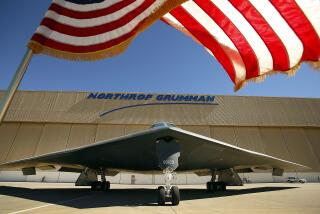New air tanker fleet is still pie in the sky
- Share via
The multibillion-dollar competition to build aerial refueling tankers for the Air Force is expected to kick off this week as the Pentagon spells out its latest requirements to replace its aging fleet of Eisenhower-era aircraft.
But there are already signs that the competition could be derailed once again. Century City-based Northrop Grumman Corp., one of the two contenders, has threatened to withdraw its bid, accusing the Air Force of writing specifications that favor its rival, Boeing Co.
The latest specs for the tankers, which refuel warplanes in flight, are due out this week -- possibly as early as Tuesday. It would mark the third time that the Pentagon has tried to award one of the largest military contracts in U.S. history. It has been scrapped twice amid accusations of ethical breaches and technical mistakes.
Northrop, which is teamed with Airbus parent European Aeronautic Defense & Space Co., and some analysts contend that the odds are stacked against Northrop’s bid for the contract, potentially worth about $35 billion.
That hasn’t stopped the company from launching a major public relations campaign, with its senior executives traveling to states that stand to reap economic benefits if the Northrop-Airbus team wins. This month alone, Northrop officials have met with lawmakers in Ohio, Florida, Michigan and North Carolina.
“We’re just advising people that there’s an opportunity for thousands of jobs in their state if we win the competition,” said Randy Belote, a Northrop spokesman. “That opportunity could be taken away if the final Request for Proposal does not undergo substantive changes.”
Northrop officials maintain that the draft version of the so-called RFP, which outlines the specifications for the tanker and how contenders would be judged, call for a smaller aircraft with limited capabilities, the kind that Boeing is expected to pitch.
Scott Hamilton, an aviation industry consultant in Issaquah, Wash., said Northrop won the previous competition in 2007 with a modified Airbus A330 because of the plane’s ability to haul more fuel, cargo and troops and carry out more medical evacuations than Boeing’s smaller 767-based tanker.
Northrop beat Boeing in a major upset after the Pentagon canceled the first contract that was awarded to Boeing amid an ethics scandal that led to a Boeing executive and a former Air Force official being sent to federal prison. The second contract with Northrop was voided after the Government Accountability Office found technical flaws with the RFP.
The current competition is centered on price, not “best value,” Hamilton said, pointing to a line in the Pentagon’s Aircraft Investment Plan submitted in its fiscal 2011 budget that says that the tanker’s capabilities of “airlift, communications support and aeromedical evacuations are secondary.”
Lt. Gen. Mark Shackelford, military deputy responsible for Air Force acquisition, told reporters at a conference last week that the Pentagon can’t force Northrop to compete, “nor are we willing to make a change in the process solely to their advantage.”
Another option, analysts said, is a split-buy, in which each company would get to build 12 planes a year.
But that isn’t likely because Defense Secretary Robert M. Gates has opposed such an arrangement, said James McAleese, a lawyer in McLean, Va., who specializes in military contracts. It would cost the government billions of dollars more than if the Pentagon chose one winner, he said.
More to Read
Inside the business of entertainment
The Wide Shot brings you news, analysis and insights on everything from streaming wars to production — and what it all means for the future.
You may occasionally receive promotional content from the Los Angeles Times.











